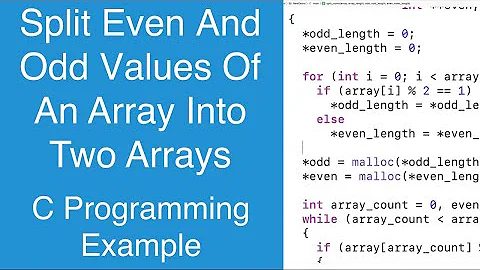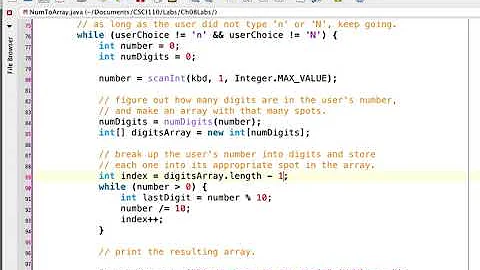Fastest way to separate the digits of an int into an array in .NET?
Solution 1
How about:
public static int[] ConvertToArrayOfDigits(int value)
{
int size = DetermineDigitCount(value);
int[] digits = new int[size];
for (int index = size - 1; index >= 0; index--)
{
digits[index] = value % 10;
value = value / 10;
}
return digits;
}
private static int DetermineDigitCount(int x)
{
// This bit could be optimised with a binary search
return x < 10 ? 1
: x < 100 ? 2
: x < 1000 ? 3
: x < 10000 ? 4
: x < 100000 ? 5
: x < 1000000 ? 6
: x < 10000000 ? 7
: x < 100000000 ? 8
: x < 1000000000 ? 9
: 10;
}
Note that this won't cope with negative numbers... do you need it to?
EDIT: Here's a version which memoizes the results for under 10000, as suggested by Eric. If you can absolutely guarantee that you won't change the contents of the returned array, you could remove the Clone call. It also has the handy property of reducing the number of checks to determine the length of "large" numbers - and small numbers will only go through that code once anyway :)
private static readonly int[][] memoizedResults = new int[10000][];
public static int[] ConvertToArrayOfDigits(int value)
{
if (value < 10000)
{
int[] memoized = memoizedResults[value];
if (memoized == null) {
memoized = ConvertSmall(value);
memoizedResults[value] = memoized;
}
return (int[]) memoized.Clone();
}
// We know that value >= 10000
int size = value < 100000 ? 5
: value < 1000000 ? 6
: value < 10000000 ? 7
: value < 100000000 ? 8
: value < 1000000000 ? 9
: 10;
return ConvertWithSize(value, size);
}
private static int[] ConvertSmall(int value)
{
// We know that value < 10000
int size = value < 10 ? 1
: value < 100 ? 2
: value < 1000 ? 3 : 4;
return ConvertWithSize(value, size);
}
private static int[] ConvertWithSize(int value, int size)
{
int[] digits = new int[size];
for (int index = size - 1; index >= 0; index--)
{
digits[index] = value % 10;
value = value / 10;
}
return digits;
}
Note that this doesn't try to be thread-safe at the moment. You may need to add a memory barrier to make sure that the write to the memoized results isn't visible until the writes within the individual result are visible. I've given up trying to reason about these things unless I absolutely have to. I'm sure you can make it lock-free with effort, but you should really get someone very smart to do so if you really need to.
EDIT: I've just realised that the "large" case can make use of the "small" case - split the large number into two small ones and use the memoised results. I'll give that a go after dinner and write a benchmark...
EDIT: Okay, ready for a giant amount of code? I realised that for uniformly random numbers at least, you'll get "big" numbers much more often than small ones - so you need to optimise for that. Of course, that might not be the case for real data, but anyway... it means I now do my size tests in the opposite order, hoping for big numbers first.
I've got a benchmark for the original code, the simple memoization, and then the extremely-unrolled code.
Results (in ms):
Simple: 3168
SimpleMemo: 3061
UnrolledMemo: 1204
Code:
using System;
using System.Diagnostics;
class DigitSplitting
{
static void Main()
{
Test(Simple);
Test(SimpleMemo);
Test(UnrolledMemo);
}
const int Iterations = 10000000;
static void Test(Func<int, int[]> candidate)
{
Random rng = new Random(0);
Stopwatch sw = Stopwatch.StartNew();
for (int i = 0; i < Iterations; i++)
{
candidate(rng.Next());
}
sw.Stop();
Console.WriteLine("{0}: {1}",
candidate.Method.Name, (int) sw.ElapsedMilliseconds);
}
#region Simple
static int[] Simple(int value)
{
int size = DetermineDigitCount(value);
int[] digits = new int[size];
for (int index = size - 1; index >= 0; index--)
{
digits[index] = value % 10;
value = value / 10;
}
return digits;
}
private static int DetermineDigitCount(int x)
{
// This bit could be optimised with a binary search
return x < 10 ? 1
: x < 100 ? 2
: x < 1000 ? 3
: x < 10000 ? 4
: x < 100000 ? 5
: x < 1000000 ? 6
: x < 10000000 ? 7
: x < 100000000 ? 8
: x < 1000000000 ? 9
: 10;
}
#endregion Simple
#region SimpleMemo
private static readonly int[][] memoizedResults = new int[10000][];
public static int[] SimpleMemo(int value)
{
if (value < 10000)
{
int[] memoized = memoizedResults[value];
if (memoized == null) {
memoized = ConvertSmall(value);
memoizedResults[value] = memoized;
}
return (int[]) memoized.Clone();
}
// We know that value >= 10000
int size = value >= 1000000000 ? 10
: value >= 100000000 ? 9
: value >= 10000000 ? 8
: value >= 1000000 ? 7
: value >= 100000 ? 6
: 5;
return ConvertWithSize(value, size);
}
private static int[] ConvertSmall(int value)
{
// We know that value < 10000
return value >= 1000 ? new[] { value / 1000, (value / 100) % 10,
(value / 10) % 10, value % 10 }
: value >= 100 ? new[] { value / 100, (value / 10) % 10,
value % 10 }
: value >= 10 ? new[] { value / 10, value % 10 }
: new int[] { value };
}
private static int[] ConvertWithSize(int value, int size)
{
int[] digits = new int[size];
for (int index = size - 1; index >= 0; index--)
{
digits[index] = value % 10;
value = value / 10;
}
return digits;
}
#endregion
#region UnrolledMemo
private static readonly int[][] memoizedResults2 = new int[10000][];
private static readonly int[][] memoizedResults3 = new int[10000][];
static int[] UnrolledMemo(int value)
{
if (value < 10000)
{
return (int[]) UnclonedConvertSmall(value).Clone();
}
if (value >= 1000000000)
{
int[] ret = new int[10];
int firstChunk = value / 100000000;
ret[0] = firstChunk / 10;
ret[1] = firstChunk % 10;
value -= firstChunk * 100000000;
int[] secondChunk = ConvertSize4(value / 10000);
int[] thirdChunk = ConvertSize4(value % 10000);
ret[2] = secondChunk[0];
ret[3] = secondChunk[1];
ret[4] = secondChunk[2];
ret[5] = secondChunk[3];
ret[6] = thirdChunk[0];
ret[7] = thirdChunk[1];
ret[8] = thirdChunk[2];
ret[9] = thirdChunk[3];
return ret;
}
else if (value >= 100000000)
{
int[] ret = new int[9];
int firstChunk = value / 100000000;
ret[0] = firstChunk;
value -= firstChunk * 100000000;
int[] secondChunk = ConvertSize4(value / 10000);
int[] thirdChunk = ConvertSize4(value % 10000);
ret[1] = secondChunk[0];
ret[2] = secondChunk[1];
ret[3] = secondChunk[2];
ret[4] = secondChunk[3];
ret[5] = thirdChunk[0];
ret[6] = thirdChunk[1];
ret[7] = thirdChunk[2];
ret[8] = thirdChunk[3];
return ret;
}
else if (value >= 10000000)
{
int[] ret = new int[8];
int[] firstChunk = ConvertSize4(value / 10000);
int[] secondChunk = ConvertSize4(value % 10000);
ret[0] = firstChunk[0];
ret[1] = firstChunk[0];
ret[2] = firstChunk[0];
ret[3] = firstChunk[0];
ret[4] = secondChunk[0];
ret[5] = secondChunk[1];
ret[6] = secondChunk[2];
ret[7] = secondChunk[3];
return ret;
}
else if (value >= 1000000)
{
int[] ret = new int[7];
int[] firstChunk = ConvertSize4(value / 10000);
int[] secondChunk = ConvertSize4(value % 10000);
ret[0] = firstChunk[1];
ret[1] = firstChunk[2];
ret[2] = firstChunk[3];
ret[3] = secondChunk[0];
ret[4] = secondChunk[1];
ret[5] = secondChunk[2];
ret[6] = secondChunk[3];
return ret;
}
else if (value >= 100000)
{
int[] ret = new int[6];
int[] firstChunk = ConvertSize4(value / 10000);
int[] secondChunk = ConvertSize4(value % 10000);
ret[0] = firstChunk[2];
ret[1] = firstChunk[3];
ret[2] = secondChunk[0];
ret[3] = secondChunk[1];
ret[4] = secondChunk[2];
ret[5] = secondChunk[3];
return ret;
}
else
{
int[] ret = new int[5];
int[] chunk = ConvertSize4(value % 10000);
ret[0] = value / 10000;
ret[1] = chunk[0];
ret[2] = chunk[1];
ret[3] = chunk[2];
ret[4] = chunk[3];
return ret;
}
}
private static int[] UnclonedConvertSmall(int value)
{
int[] ret = memoizedResults2[value];
if (ret == null)
{
ret = value >= 1000 ? new[] { value / 1000, (value / 100) % 10,
(value / 10) % 10, value % 10 }
: value >= 100 ? new[] { value / 100, (value / 10) % 10,
value % 10 }
: value >= 10 ? new[] { value / 10, value % 10 }
: new int[] { value };
memoizedResults2[value] = ret;
}
return ret;
}
private static int[] ConvertSize4(int value)
{
int[] ret = memoizedResults3[value];
if (ret == null)
{
ret = new[] { value / 1000, (value / 100) % 10,
(value / 10) % 10, value % 10 };
memoizedResults3[value] = ret;
}
return ret;
}
#endregion UnrolledMemo
}
Solution 2
1 + Math.Log10(num) will give the number of digits without any searching/looping:
public static byte[] Digits(int num)
{
int nDigits = 1 + Convert.ToInt32(Math.Floor(Math.Log10(num)));
byte[] digits = new byte[nDigits];
int index = nDigits - 1;
while (num > 0) {
byte digit = (byte) (num % 10);
digits[index] = digit;
num = num / 10;
index = index - 1;
}
return digits;
}
Edit: Possibly prettier:
public static byte[] Digits(int num)
{
int nDigits = 1 + Convert.ToInt32(Math.Floor(Math.Log10(num)));
byte[] digits = new byte[nDigits];
for(int i = nDigits - 1; i != 0; i--)
{
digits[i] = (byte)(num % 10);
num = num / 10;
}
return digits;
}
Solution 3
convert integer to string and then use String.Chars[]
Solution 4
Millions of times isn't that much.
// input: int num >= 0
List<byte> digits = new List<byte>();
while (num > 0)
{
byte digit = (byte) (num % 10);
digits.Insert(0, digit); // Insert to preserve order
num = num / 10;
}
// if you really want it as an array
byte[] bytedata = digits.ToArray();
Note that this could be changed to cope with negative numbers if you change byte to sbyte and test for num != 0.
Solution 5
'Will' vs 'Does'? I'm a huge fan of optimizing code after it's wrote, profiled, and it's been determined to be the bottleneck.
Related videos on Youtube
Moayad Mardini
Working with startups in three continents. Backend developer using Python/Django. Microsoft Developer Network moderator. SOreadytohelp
Updated on April 15, 2022Comments
-
 Moayad Mardini about 2 years
Moayad Mardini about 2 yearsI want to separate the digits of an integer, say 12345, into an array of bytes {1,2,3,4,5}, but I want the most performance effective way to do that, because my program does that millions of times.
Any suggestions? Thanks.
-
Russell Steen over 14 yearsIf it's really critical, then try to get ALL of the ways, and benchmark them yourself, using cycles that will simulate your real environment.
-
 Moayad Mardini over 14 yearsOK, I don't know all the possible ways, would you suggest some of?
Moayad Mardini over 14 yearsOK, I don't know all the possible ways, would you suggest some of? -
plinth over 14 yearsdo you really mean to separate out the base 10 digits or you mean byte by byte?
-
Eric Lippert over 14 yearsDo you know anything about the input? For example, do you know that the integer will always be positive? Do you know that it will always be less than a million? And so on. You can get good optimizations if you can reduce the scope of the problem.
-
 Chris over 14 yearsThis is really interesting. I am curious. Why are you doing this?
Chris over 14 yearsThis is really interesting. I am curious. Why are you doing this?
-
-
Daniel Elliott over 14 yearsWhy the downvote? +! premature optimisation is the root of all evil
-
Jon Skeet over 14 years@Thorarin: Good idea, but there's a better one :)
-
cdiggins over 14 yearsYour answer is a non-answer. How do you know he didn't write and profile the code, and that he does know this to be the the bottleneck.
-
cdiggins over 14 yearsSeveral expensive operations here: allocate a list, insert into a list, convert to an array. It could be sped up by an order of at least a hundred.
-
 Moayad Mardini over 14 years@cdiggins: Yes, thanks, this is the bottleneck of my program's logic.
Moayad Mardini over 14 years@cdiggins: Yes, thanks, this is the bottleneck of my program's logic. -
Thorarin over 14 yearsActually, I'm not certain it's "better". In theory it should be, but the
for (int i = 0; i < size; i++)is optimized by the JIT compiler to be faster thanfor (int i = size - 1; i >= 0; i--). Kinda stupid, I know :( I was mostly going for readability. -
Joren over 14 yearsIt's of course easy to get rid of the zeroes by copying the relevant digits to a new array before returning. Okay, it iterates over the array again, but for an array that's 10 entries long I really don't see a problem with that.
-
Joren over 14 yearsIt'd be way better just to start filling up an array of 10 items in reverse order and then copying the digits to a new array later.
-
Joren over 14 yearsA kitten dies every time someone uses strings for doing simple arithmetic.
-
cdiggins over 14 yearsThe extra iteration is exactly corret. The only probably we would run into is millions of array allocations. Faster to pre-allocate 10 static arrays, and choose the correct one afterwards.
-
Eric Lippert over 14 yearsYou could potentially make this faster on average by memoizing the result.
-
Joren over 14 yearsI had thought of splitting the number in two halves and implemented it, and it is indeed faster than your current solution.
-
John K over 14 yearsThe nice thing about a regular expression being present is you can modify the pattern to exclude special numeric-related symbols like . $ E, etc if you wanted only the digits extracted before being split.
-
DK. over 14 yearsFirst solution had "hard to beat" performance (get rid of function call to improve it). 2nd solution... too many typos and Clone() will kill most of performance gain.
-
sentry07 over 14 yearsI'm returning from 400k to 500k random integers (from 1 to 9 digits) a second.
-
Nick over 14 years"Hardware is Cheap, Programmers are Expensive."
-
Obi over 14 yearsHe said my code will, not does. He inferred future tense, and yes as stated. Premature optimization is the root of all evil.








